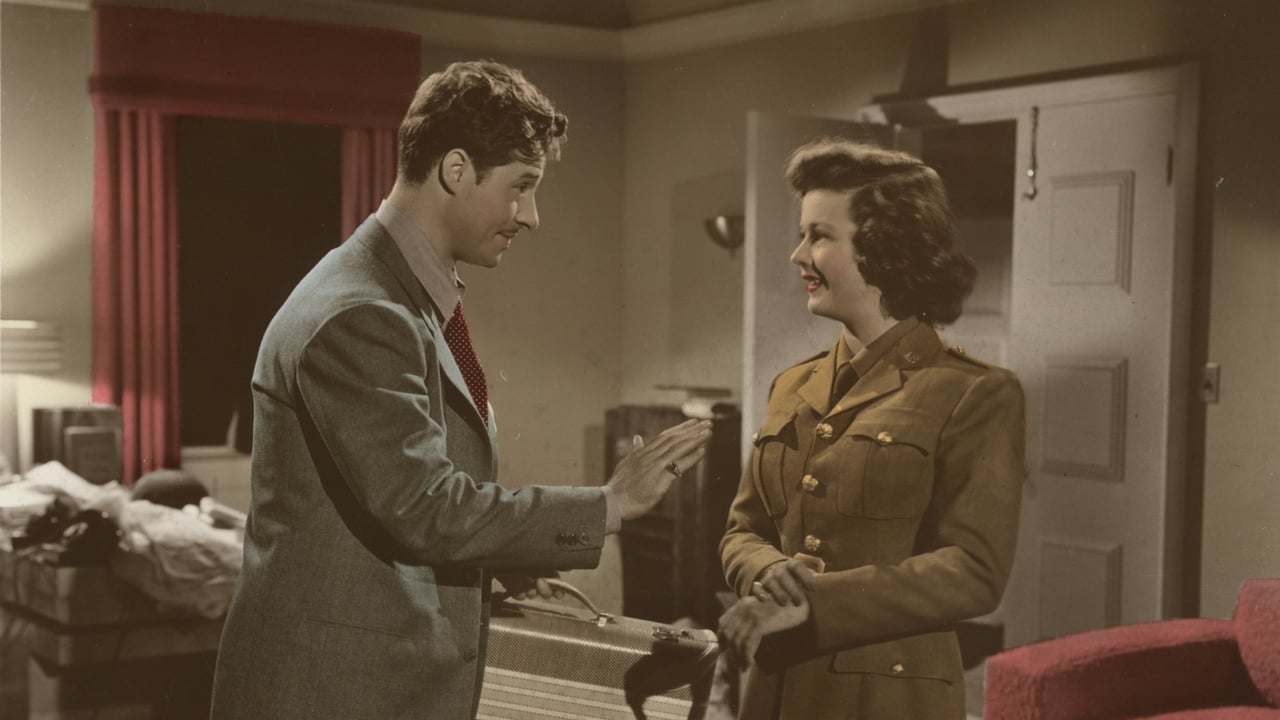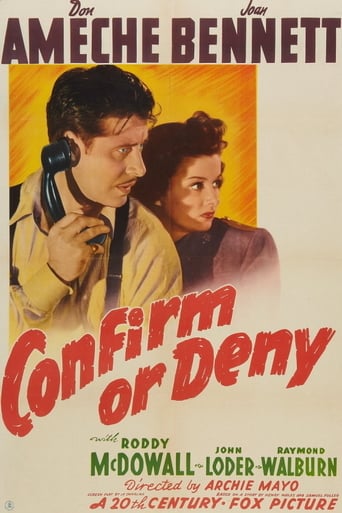



SERIOUSLY. This is what the crap Hollywood still puts out?
View MorePurely Joyful Movie!
A bit overrated, but still an amazing film
This is a must-see and one of the best documentaries - and films - of this year.
View MoreBefore the U.S. entered World War II, the American public flocked to theaters to see the occasional movies about the war raging in Europe. Newspapers and radios reported news on the war. But, in those years before commercial television, the movies would have been the place to see what was going on, however fictional the films may have been. Even non-war features frequently had war updates with some video in the Movietone News. Those newsreels were begun by Fox News in 1919 and continued in theaters until 1963 after the merged (1935) 20th Century Pictures and Fox. But the release of "Confirm or Deny" must have been received quite differently than earlier films. That's because it had been in production since early 1941, but set during September 1940 with the start of the London Blitzkrieg. Yet the film didn't hit theaters until December 12 – five days after the Dec. 7, 1941 bombing of Pearl Harbor. So, when people went to see this film, America was in the war. The U.S. Congress declared war on Japan on Dec. 8, and declared war on Germany on Dec. 11. The latter was just hours after Germany first declared war on the U.S. Apparently, "Confirm or Deny" premiered on Nov. 19, but wasn't released for more than three weeks. I couldn't find any more history about this particular film, but one wonders if 20th Century Fox had reservations about releasing it. It had reason to question its release because of a major impetus of the plot. Don Ameche plays a news syndicate manager in London (Mitch Mitchell) who is intent on beating all others with the latest news about Hitler's invasion of England. He thinks it is imminent. That was the thinking and worry of many in 1940, even after the Blitzkrieg began on Sept. 7. But by then, Germany had failed to gain air superiority over England. So, Hitler ordered the Blitzkrieg, in the hopes of pounding the British into submission. That's where we are at the start of this film. But probably even before this film's finish, the Germans had stopped the Blitzkrieg. By May 1941, the Luftwaffe had lost so many aircraft over England that it couldn't adequately support war on two fronts. In May, Hitler decided to invade the Soviet Union, which he did on June 22. So, well before this film came out, the fears of a German invasion of England had all but ended. The studio was faced with a total loss if it canceled the release altogether of "Confirm or Deny." It went with the release, willing to take barbs for the film being outdated and having a wrong conclusion. I'm glad it did, because it does give some historical sense of the war as it was being lived in England at the start of the Blitz. The film also has a romance that in this case, fits nicely as part of the overall plot. Joan Bennett plays the object of Mitchell's interest, as Jennifer Carson. The film has a significant cast of the day. All are very good in their roles. Others include English actor John Loder and Irish actor Arthur Shields; long-time character actor Raymond Walburn; wonderful British comedy actor of stage and screen, Eric Blore, in one of his few serious roles as the hotel manager; and a young Roddy McDowell in his 19th film. All of the filming was done at 20th Century Fox studios in California. There were not large outdoor scenes or skylines, so the sets were relatively simple. When Mitchell first meets Carson, he is about to light up a cigarette at night outdoors. She blows out his match. That scene would seem natural, because it was just after the Blitz began in London, and people were just getting used to blackouts at night. Those interested in history may appreciate this little bit of more information. Three other movies were made about the press and American correspondents before the U.S. was in the war or sent troops to England. All were in 1940 and were very good films. They included, "Arise My Love," "Comrade X," and "Foreign Correspondent." Two more wartime correspondent movies came out in September 1942. "Somewhere I'll Find You," was nearly two years in the making and was the last movie Clark Gable made before enlisting for WW II in the Army Air Corps. "Berlin Correspondent" starred Dana Andrews as an American reporter in the German capital before 1942. Here are some of my favorite lines from the film. For more comedy dialog, see the Quotes section under this IMDb Web page of the movie.Jennifer, "I'm staying with my grandmother." Mitch, "Well, I'd like to meet her." Jennifer, "My grandmother?" Mitch, "Yes!' Jenifer, "Why?" Mitch, "Oh, I love grandmothers. I have two of my own back in the States. They run a little tearoom. Uh, tell me, will you have a spot of tea with me?" Jennifer, "Are you in the habit of picking up girls in the blackout?" Mitch, "Well, how can you say such a thing? How can you even think such a thing?" Jennifer, "Are you trying to tell me you're not trying to pick me up?" Mitch, "Well, no, of course not." Jennifer, "Why does she keep staring at me in that way?" Mitch, "You're wearing her dress." Mitch, "Oh, you got me wrong, Red. I'm strictly a one-woman man." Jennifer, "One at a time, you mean."
View MoreDon Ameche stars as Mitch, a glib American reporter stationed in England just as the Blitz is about to take place. He's a not particularly nice guy--a bit of a departure for Ameche. This is because he's mostly concerned with two things--women and getting a scoop. Whether the Brits lose to the Nazis doesn't seem that important to Mitch and he has this attitude through almost all of the film. Then, late in the film Albert (Roddy McDowell) is killed in a bombing raid and INSTANTLY Mitch becomes a patriot and kills a story that could hurt the British war effort! This change is completely counter to who Mitch was and should have resulted in a slower change...not one like you see in the film. It's obvious that the film was intended as propaganda and to bolster US support for the war...but stretching out the film another 10-15 minutes and showing a realistic change in Mitch would have made it an exceptional film...not a transparent and superficial one like it is.
View MoreThough it has some glaring tonal shifts this little charmer should be better known then it is.Don Ameche stars as a brash, to put it mildly, news reporter who bulldozes his way to whatever he wants in London during the Blitz. One night while walking during a blackout he happens to meet a lovely Joan Bennett and practically sweeps her off her feet. When the air raid sirens go off they end up spending the night in a tube station with dozens of others, when he wakes up and she's gone leaving behind a cheeky note that would be the end of it for most men but not for Ameche who doggedly finds out her identity and finagles a way for them to work together. From there it's a fast dance towards love amongst the threat of bombs and assorted crises. It's all pretty breezy with nice performances by the stars but being a war movie reality occasionally intrudes leading to those jarring shifts.Still certainly as good as many other better known movies from the era why this one has fallen through the cracks is a puzzler.
View MoreWhether or not this is one hundred percent fictional or fact, one truth does remain. The United States of America needed to know what Europe was already facing for years before they got into the historical era known as World War II. Alfred Hitchcock had already given the uninvolved Americans a piece of this with the Oscar Nominated "Foreign Correspondent", and the year after this, the star of that film, Dana Andrews, starred in the 20th Century Fox "B" drama "Berlin Correspondent". All "Confirm or Deny" strives to be is a slice of life taste of what was going on under America's nose that we couldn't see unless we were "over there". Don Ameche, one of the most popular actors of this era, took on the role of "London Correspondent", and whether or not he is representative of the truth, he does an excellent job with the part.Working pretty much from an underground bunker, Ameche learns to hate that word known as "censored". Every time the military stamps that on one of his correspondences to be approved, he gets irate, but as he soon has to learn, we don't want the enemy to know that we know what they are up to. In this case, it is the fact that Ameche has learned that the Fuhrer is as close as Calais, and possibly on his way to London to oversee an invasion. In one of the opening scenes, he's stuck outside in a blackout, meeting up with the cockney voiced Joan Bennett (!) who berates him for lighting a match. He's impressed with her moxie, and before long, she's working his teletype and overtime as well, going out on dates with him. Bennett's attempt at a British accent is almost comical considering her obvious American upbringing, but her character is totally charming. Gone for this film are the long Hedy Lamarr tresses, and a simple, more sophisticated hairstyle makes her look almost like Myrna Loy.Young Roddy McDowall plays a cheery British kid who works for Ameche, keeping his eye out for carrier pigeons. Totally the epitome of the "Chin Up, Pip pip, Cherrio" stereotype, he is even cheery when Ameche wakes him up at daybreak, always eager to please, and excited beyond belief when a pigeon with a message does come in for a landing. Eric Blore is his old droll self as the manager of the hotel above the bunker, while Raymond Walburn just plays an old fool who keeps sticking his foot in his mouth. This is typical war propaganda, whether or not America was in it at the time, and there certainly have been worse films and others which have gone on to become downright classics. But I have to say that this is one of the more enjoyable films, fraught with occasional tension (a seemingly dud bomb is revealed to be on a timer), light romance and comedy. I just loved Bennett's reaction to the girl she later finds out whose dress Ameche has stolen (looking quite odd to a hotel clerk while walking through a hotel lobby carrying women's clothing) and asking him why the dame hidden by the hair is staring at her.
View More